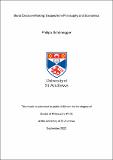Files in this item
Moral decision-making : essays from philosophy and economics
Item metadata
| dc.contributor.advisor | Pummer, Theron | |
| dc.contributor.advisor | Costa-Gomes, Miguel | |
| dc.contributor.author | Schönegger, Philipp | |
| dc.coverage.spatial | 232 p. | en_US |
| dc.date.accessioned | 2022-12-13T12:09:58Z | |
| dc.date.available | 2022-12-13T12:09:58Z | |
| dc.date.issued | 2023-06-12 | |
| dc.identifier.uri | https://hdl.handle.net/10023/26584 | |
| dc.description.abstract | This thesis investigates moral decision-making from the two disciplinary angles of philosophy and economics. Moral decision-making includes moral judgements (e.g., judgements as to the moral (im-)permissibility of actions) and moral behaviour (e.g., charitable giving). The topic choice throughout this thesis was primarily motivated by global priorities research, ranging from population ethics to effective charitable giving. The first three chapter primarily focus on experimental philosophy. In them, I (a) investigate the relationship between the dark triad personality traits, psychopathy, Machiavellianism, and narcissism and anti-natalist views, finding that those high on dark triad traits are significantly more likely to endorse anti-natalist views. I also find that this relationship is mediated by depression. Then, I (b) study reflective equilibrium behaviour in the context of population ethics, finding that in accordance with theory, concrete case judgements play a revisionary role with respect to endorsements of general moral principles. Further, I (c) argue that research in psychology and experimental philosophy has not adequately dealt with the issue of incentivisation. I then go on to conduct an empirical showcase of the Bayesian Truth Serum in this context, demonstrating impacts on response behaviour. The last three chapters focus on experimental economics. I (d) analyse charitable giving behaviour under normative uncertainty and show that randomly allocated expert advice is undervalued by donors, though can impact donation behaviour and reduce uncertainty. Then, I (e) investigate the effect of morally demanding charitable solicitations on donor behaviour, finding that while moral arguments raise donations, increases of moral demandingness do not. Lastly, I (f) analyse the predictors of donating to probabilistic and ambiguous charities as opposed to more reliable ones, failing to find an impact of risk and ambiguity uncertainty. Overall, I hope that the work presented in this thesis is able to advance global priorities research into these topics. | en_US |
| dc.language.iso | en | en_US |
| dc.subject | Judgement and decision-making | en_US |
| dc.subject | Experimental philosophy | en_US |
| dc.subject | Experimental economics | en_US |
| dc.subject | Behavioural economics | en_US |
| dc.subject | Social and personality psychology | en_US |
| dc.subject | Charitable giving | en_US |
| dc.subject | Dark triad | en_US |
| dc.subject | Reflective equilibrium | en_US |
| dc.subject | Incentivisation | en_US |
| dc.title | Moral decision-making : essays from philosophy and economics | en_US |
| dc.type | Thesis | en_US |
| dc.contributor.sponsor | Forethought Foundation for Global Priorities Research | en_US |
| dc.contributor.sponsor | Center for Effective Altruism (CEA) | en_US |
| dc.contributor.sponsor | Giving What We Can (GWWC) | en_US |
| dc.type.qualificationlevel | Doctoral | en_US |
| dc.type.qualificationname | PhD Doctor of Philosophy | en_US |
| dc.publisher.institution | The University of St Andrews | en_US |
| dc.rights.embargodate | 2027-11-25 | |
| dc.rights.embargoreason | Thesis restricted in accordance with University regulations. Restricted until 25th November 2027 | en |
| dc.identifier.doi | https://doi.org/10.17630/sta/238 |
This item appears in the following Collection(s)
Items in the St Andrews Research Repository are protected by copyright, with all rights reserved, unless otherwise indicated.


